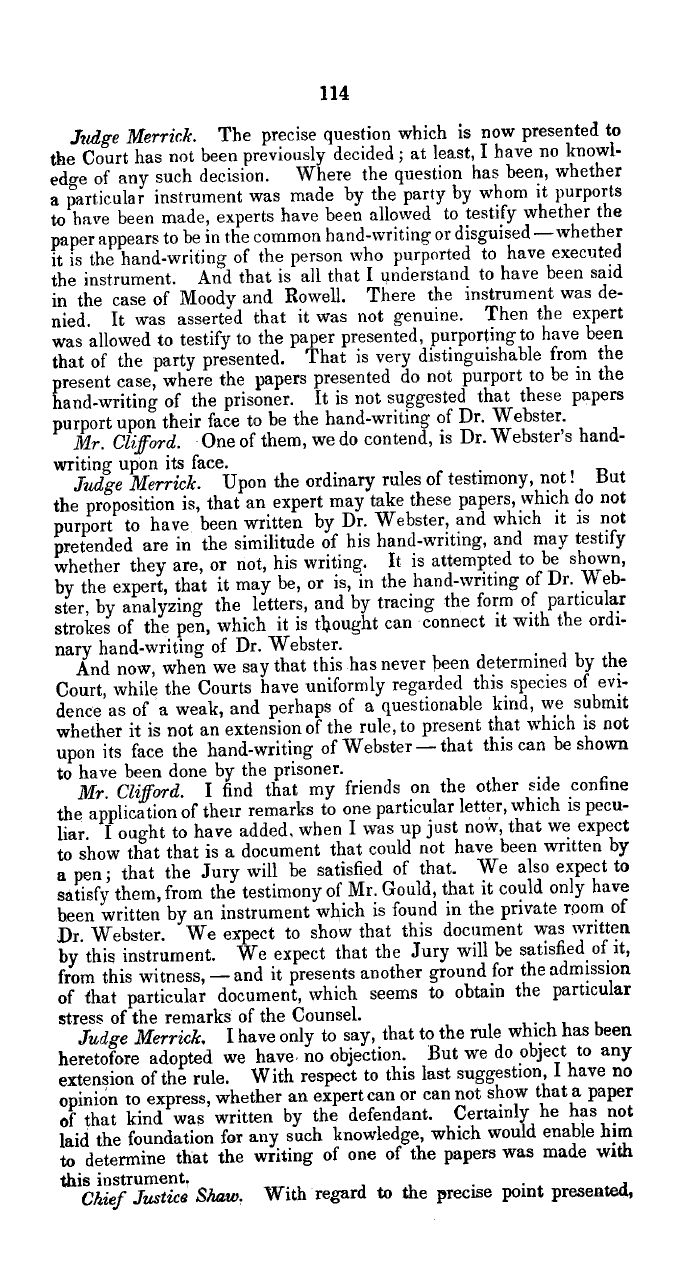|
114
Judge Merrick. The precise question which is now presented to
the Court has not been previously decided ; at least, I have no knowl-
edge of any such decision. Where the question has been, whether
a particular instrument was made by the party by whom it purports
to have been made, experts have been allowed to testify whether the
paper appears to be in the common hand-writing or disguised-whether
it is the hand-writing of the person who purported to have executed
the instrument. And that is all that I understand to have been said
in the case of Moody and Rowell. There the instrument was de-
nied. It was asserted that it was not genuine. Then the expert
was allowed to testify to the paper presented, purporting to have been
that of the party presented. That is very distinguishable from the
present case, where the papers presented do not purport to be in the
hand-writing of the prisoner. It is not suggested that these papers
purport upon their face to be the hand-writing of Dr. Webster.
Mr. Clifford. One of them, we do contend, is Dr. Webster's hand-
writing upon its face.
Judge Merrick. Upon the ordinary rules of testimony, not! But
the proposition is, that an expert may take these papers, which do not
purport to have been written by Dr. Webster, and which it is not
pretended are in the similitude of his hand-writing, and may testify
whether they are, or not, his writing. It is attempted to be shown,
by the expert, that it may be, or is, in the hand-writing of Dr. Web-
ster, by analyzing the letters, and by tracing the form of particular
strokes of the pen, which it is thought can connect it with the ordi-
nary hand-writing of Dr. Webster.
And now, when we say that this has never been determined by the
Court, while the Courts have uniformly regarded this species of evi-
dence as of a weak, and perhaps of a questionable kind, we submit
whether it is not an extension of the rule, to present that which is not
upon its face the hand-writing of Webster -that this can be shown
to have been done by the prisoner.
Mr. Clifford. I find that my friends on the other side confine
the application of their remarks to one particular letter, which is pecu-
liar. I ought to have added, when I was up just now, that we expect
to show that that is a document that could not have been written by
a pen; that the Jury will be satisfied of that. We also expect to
satisfy them, from the testimony of Mr. Gould, that it could only have
been written by an instrument which is found in the private room of
Dr. Webster. We expect to show that this document was written
by this instrument. We expect that the Jury will be satisfied of it,
from this witness, -and it presents another ground for the admission
of that particular document, which seems to obtain the particular
stress of the remarks of the Counsel.
Judge Merrick. I have only to say, that to the rule which has been
heretofore adopted we have, no objection. But we do object to any
extension of the rule. With respect to this last suggestion, I have no
opinion to express, whether an expert can or can not show that a paper
of that kind was written by the defendant. Certainly he has not
laid the foundation for any such knowledge, which would enable him
to determine that the writing of one of the papers was made with
this instrument.
Chief Justice Shaw. With regard to the precise point presented,
|

